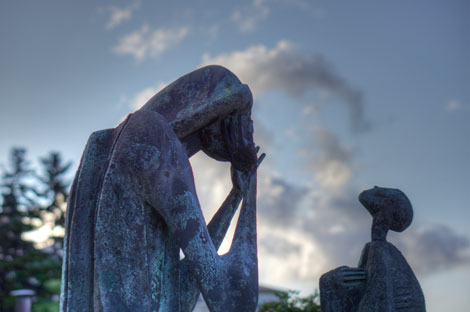by Alan Briskin | Books, Business
My publisher, Berrett-Koehler, is featuring my book, Bringing Your Soul to Work, as a free e-book over the next 48 hours. They also offering 40% discount and free shipping on all their publications, including my other books, The Power of Collective Wisdom and The Stirring of Soul in the Workplace. Great as gifts for friends. Get your free e-copy now.
by Alan Briskin | Business, Collective Folly

Mixing in Leonard Cohen, Fortune Magazine, the Amida confession on Yom Kippur, Pope Francis, Volkswagen, and metaphors involving apples, I cooked up a hearty stew published on Huffington Post that I hope you will enjoy.
by Alan Briskin | Business, Collective Wisdom, Community, Conflict, Leadership, Photography

Robert Moffat, senior vice president of IBM systems and technology group, was recently arrested by the FBI for conspiracy involving insider trading. The arrest sent shock ways through Wall Street exposing illicit, back channel dealings between prominent high tech executives and hedge fund managers. My information comes directly from Fortune Magazine, also seemingly shocked by it all, and reminding me of the policeman character in Casablanca played by Claude Rains who closes Rick’s Café by telling Humphrey Bogart, “I’m shocked, shocked to find out that gambling is going on here.”
Robert Moffat apparently was a hard working and respected executive considered a potential successor for CEO at IBM. The Fortune article describes him as a numbers cruncher, former Eagle Scout, and a man weighing in at 6-foot-2 and 265 pounds – a solid guy on all fronts. He had become sexually involved with a woman who worked for a hedge fund and she was quoted saying that trading business information was for her “like an orgasm.” The tale becomes more complicated as she was in love with her married hedge fund boss but it didn’t work out. Shocking.
One of Moffat’s attorney colleagues summed it up best: “There was no planet on which I could have understood what was being said about Bob. I just shut down.”
So we have insider trading among millionaires and billionaires, an Eagle Scout who seems to have it all risking everything, a woman who finds stimulation rubbing shoulders (at least) with powerful men, and another man who simply cannot comprehend how a straight shooter like Bob could go wrong. Well, there certainly is a lot to be shocked about. What we have here is a collective collapse. Most disturbing to me is the notion expressed by Bob’s colleague that he knows of no planet to understand what happened?
SEARCHING FOR NEW PLANETS
To be simply less shocked is not an answer to collective collapse but instead an even more cynical and destructive position. Following the lead of Bob’s attorney friend, I propose we look for new planets in which this behavior can be understood. We must also look for planets in which terms such as business ethics and collective wisdom are real practices as opposed to oxymorons.
PLANET INNER GALLEON (named after a hedge fund, Galleon Group, involved in the scandal):
On planet Inner Galleon, people are acutely aware of self-deception and self justification. Business schools take seriously the Arbinger Institute’s caution that “Over time, as we betray ourselves, we come to see ourselves in certain self justifying ways.” People on this planet have become comfortable acknowledging that collective folly is always a possibility in groups and that while we are capable of extraordinary acts of grace and kindness, we are also capable of acts of cruelty and deception. People on this planet embrace this paradox and thereby become more capable of wisdom.
They are also acutely aware that unlike the mythic view of the alpha male protecting the troops, spearheading the hunts, being exemplars, and keeping order among the group, the top ranking males are closer to their baboon ancestors in looking after themselves, seeking access to females, and always scouting for the highest and safest spot in the tree to protect themselves. This collective self knowledge allows them to speak intelligently about rules and regulation for the group and for choosing wisely those people who will administer the regulations. Even more critical, an ethic of doing what is right is reinforced constantly among the members of the group who deal directly with power and money because everyone recognizes its seductive influences. The community realizes that self deception and collective folly do not happen overnight but build slowly within a community and take root when no one seems to notice or care.

PLANET SAVATTHI (named after an ancient city in India)
On planet Savatthi, there is great regard for community and a deep understanding that all of us can get caught up in addictions of alcohol, drugs, gambling, and careless sexuality. There is a belief that guides them that these addictions represent an inner suffering and must be addressed by finding the proper antidotes within a loving community, including prayer, meditation, and healthy conversations. The people of Savatthi pay great attention to their physical and emotional environment, always cultivating beauty and reverence mixed with earthy humor and outright irreverence. On this planet, looking out for oneself or just your immediate friends and relatives is considered selfish. Both the community and planet itself is viewed as medicine, if taken properly.
On planet Savatthi, people take seriously that to lead a happy life one has to live in the company of wise and caring friends and that a community should honor those who truly contribute to the greater good of the whole. They understand one must constantly practice speaking generously from the heart and that words and deeds must be aligned.
To seek happiness on this planet means to live a simple life and to constantly marvel and delight in small things. To remain humble is understood as the greatest asset and that to pretend humility is an act of serious insincerity. Children are taught that when they speak, they should not hope that no-one disagrees with them, because without disagreement, self righteousness can flourish.
To persevere and to be open to change is considered the greatest gift and the greatest challenge. Everyone is asked to contribute their particular talent or gift and everyone is expected to cultivate their talents and apply them to a craft or profession.
PIERCING THE VEIL
No doubt these planets are obscured by heavy mist and clouds, but we are capable of knowing they are there just as we would not forget the moon exists because of a cloudy evening. We can and must look beyond our current world or we will shut down, caught in confusion and disbelief. We are explorers by nature; let us travel together in wisdom.
Further Resources:
The Power of Collective Wisdom: And the Trap of Collective Folly
Leadership and Self Deception by Arbinger Institute
Dangerous Liaisons AT IBM: Fortune Magazine, July 26th, 2010
Two Treasures by Thich Nhat Hanh, including his explanation of the Mangala Sutta
Pure Water: Poetry of Rumi, Coleman Barks – mp3 found on i-tunes
by Alan Briskin | Business, Conscious Capitalism, Consciousness, Leadership

A serial journal of cogent reflections and irreverent insights on the social effects of capitalism and the roots of partisan politics. Pairing prose with HDR photography and “flash points” drawn from current and historical perspectives, the author seeks to recover lost wisdom and courageous action beyond the shouting and noise of today’s headlines.
Chapter Nine
Wages Decline, Credit Expands, Rapidly
Time Range: 1978-1985
What I did not know, setting my sights on creativity and meaning, was that the economic rocket ship we were on was about to sputter and go sideways. For 150 years, capitalism in the United States had functioned, despite its busts and booms, to move in an upward spiral. Working people, on average, saw their real wages rising decade after decade.
Until the 1970s, every generation had a reasonable chance to expect a better life than the previous one. Imagine if my father had not believed that. If he had believed that his sacrifices would make little positive difference for his children’s circumstances. Yes, he was disappointed in me and likely wondered if my crazy talk would ever lead anywhere, but I was in college. I would have a degree that was never an option for him. Anti-Semitism was on the decline. He had no reason to fear that roads would be blocked in front of me. And they were not, but wages for the average worker hit a wall.
From 1978 to 2011, real wages after adjusting for inflation went flat, nada, nothing. I’ll say it again. As best as we know from our economic models, there have been no wage increases for the average worker since the year I finished working at St. Johnsbury prison in 1978. This means that many of the inmates who found jobs in lumber mills, retail services, maintenance, and construction would be earning exactly the same amount today, once adjusted for inflation, as when they began. Or they might be unemployed. How did this come about?
Dr. Richard Wolf is an economist with an impeccable professional pedigree. He received his undergraduate degree at Harvard, his master’s at Stanford, and his doctorate at Yale. He was educated at institutions with a reverence for capitalism but supplemented his studies with a curiosity about its critics, most notably Karl Marx. He argues that beginning in the 1970s, there were at least four trends that help us put today’s circumstances in perspective.

HDR (High Dynamic Range) Photography by Alan Briskin: multiple shots at different exposures are combined into one image in order to show “more of what’s there”.
The first was the introduction of new technology, accelerating the use of computers to replace labor. Imagine, for example, the use of scanning devices to replace people physically counting business inventories. Human beings count slowly and get distracted. Forget jobs that are repetitive and can be automated. Gone.
Second was the increasing use of offshore factories for manufacturing. Recall that surplus value is enhanced when the cost of labor decreases. Finding workers on other continents who could be paid less was the perfect marriage of increasing profit while simultaneously creating new markets.
Third was downward pressure on wages as an increasing number of women and immigrants entered the workforce. This was the period when corporations began to deal with the visible reality of diversity, but the economic effect of a greater labor supply was far less visible or obvious. Women were consistently paid less than their male counterparts, and the greater overall labor supply meant more competition for jobs, thus creating a labor market in which supply outstripped demand.
The fourth trend was a response to the first three, increased use of personal debt. As the earning power of workers was eroding, the rapid rise of credit cards began to supplement income, but at a huge cost. Will Rogers’s famous aphorism that when you find yourself in a hole, stop digging, became instead a search for bigger shovels. And there was no bigger shovel than credit cards and eventually mortgage debt. All these developments were slow moving and never in a straight line, but we can now see where they were leading.
Other social and economic forces were operating as well. In roughly the same 30-year period when workers’ wages were slowing down to a crawl, Fortune 500 companies saw corporate profit increasing as they grew in size and complexity. Amid this growth, fascination with the organizational leader (CEO) became quasi-cultish, symbolized by life-sized cutouts of Chrysler’s CEO, Lee Iacocca, filling bookstore windows. His autobiography was the best-selling hardcover nonfiction book in both 1984 and 1985. And just two years earlier, the birth of popular management books began with the hugely successful In Search of Excellence, attributing success to management savvy.
The success part turned out to be illusory, but the fascination with heroic leadership and management techniques became a major industry. Meanwhile, no one paid attention to the calculus of surplus value, how limiting wages was a driver of capital profits. In academia and professional consulting, we may have become more conscious of organizations as systems and the need for strategy, discipline, and leadership, but as citizens, we for the most part did not question the economic institution we operated within. We were, to put it simply, unconscious of capitalism and its myriad influences.
 FLASH POINT
FLASH POINT
San Francisco, 1984
In a friend’s San Francisco apartment, I dictated my doctoral dissertation from handwritten notes to a typist working with one of the first home computers. For someone who had never mastered the typewriter and whose handwriting was virtually illegible, this was a technological event with great personal meaning. Advances in technology literally gave me an opportunity to pursue my life’s work.
The subject of my dissertation, however, was somewhat off the beaten trail of society’s progress. I was researching the parallel historical conditions of social institutions such as prisons, mental institutions, public schools, and workplaces. My thesis was that surveillance and control had become dominant characteristics of these institutions, resulting in the institutionalization of the soul. We were losing a fundamental relationship with both nature and our own inner world. We were losing a spiritual connection to the transcendent, a perspective larger than just our own self-interest.
What I had not considered was another kind of person who was gaining greater and greater freedoms. This was the corporate person. I don’t mean the organizational man of the ’50s and ’60s. I’m talking about a corporate entity with the legal rights of a person and whose sole legal concern was self-interest.

Next Week:
Chapter Ten: Corporate Persons: What Does Not Serve Me Shall Not Be My Concern
Who even knew that corporations had legal rights as if they were actual persons? In a strange twist of legal gymnastics, the originating idea of a corporation being birthed and legitimized by a government grant had been transformed into a corporate body beholden to no one but its owners.
Economic self-interest was the law of the land, and the corporate persons cultivated in such an environment could be as sweet as your dear auntie or as self-serving and weird as the guy down the block wearing just a raincoat.
by Alan Briskin | Business, Conscious Capitalism, Health, Politics

A serial journal of cogent reflections and irreverent insights on the social effects of capitalism and the roots of partisan politics. Pairing prose with HDR photography and “flash points” drawn from current and historical perspectives, the author seeks to recover lost wisdom and courageous action beyond the shouting and noise of today’s headlines.
Chapter Four, Part Two:
Out of Depression and War, a New Vision of Wealth Distribution
Time Range: 1929-1944, 2012
The economic bill of rights highlighted
a scar in the American psyche. Roosevelt’s time in office, which included a
failed coup d’état directed against him, deepened the resolve of factions
opposed to government intervention. From
this moment on, a widening split would cleave those who believed in federal
intervention from those who perceived arrogance in a government that addressed
questions of economic distribution.

HDR (High Dynamic Range) Photography by Alan Briskin: multiple shots at different exposures are combined into one image in order to show “more of what’s there”.

FLASH POINT
The Obama Economy–and Ours
Government didn’t build
that.
By Patrick J. Buchanan, July 24, 2012
“If you’ve
got a business, you didn’t build that. Somebody else made that happen.” Mitt
Romney fell on this Obama quote like an NFL lineman on an end zone fumble
during the Super Bowl. And understandably so.
For this
was no gaffe, said Romney, this is what Obama believes. This is straight out of
the catechism. Obama thinks that had not the government created the
preconditions, none of us could succeed. We all depend on government. None of
us can make it on our own.
Had Obama
been channeling Isaac Newton–”If I have seen further than others it is because
I am standing on the shoulders of giants”–or John Donne — “No man is an island,
entire of itself”–many would have nodded in agreement.
But what
Obama seemed to be saying–indeed, was saying–was that, without government, no
business can succeed.
Realizing
that statement rubs against a deeply ingrained American belief–that the people
built the nation–Obama and his acolytes are charging that Romney ripped his
words out of context.
Here is Obama’s full quote:
“If you were successful, somebody along the line
gave you some help. There was a great teacher somewhere in your life. Somebody
helped to create this unbelievable American system that we have that allowed
you to thrive. Somebody invested in roads and bridges. If you’ve got a
business, you didn’t build that. Somebody else made it happen.”

Conservatives, as opposed to liberals, proclaimed that people had a right to own what they owned and government should be on a very short leash. Government intervention should be held to the strictest criteria for determining what benefited the nation as a whole, especially in regard to infringing on private property and wealth accumulation.
The danger of deviating even a little from this principle, they warned, would unleash a swarm of another form of special interest groups, mostly those not very good at earning a living. This meant limiting what government should do and how much taxes it should collect.
If Roosevelt argued the moral and
political basis for ensuring freedom from want, conservatives argued the moral
and political basis for ensuring freedom of individual rights and protecting
those who succeeded on their own without government assistance. If one side
argued against the special interests of business and corporate influences, the
other side argued against the special interests of labor and minorities.
The interdependence of the whole was
visible to some and invisible to others. Both felt the success of the nation
was at stake. Both sides felt varying
degrees of contempt for the other, to the point where even the same words would
appear to have entirely different meanings.
 FLASH POINT
FLASH POINT
US Supreme Court: Closing Arguments Regarding Health Care Mandates
New York Times, March 30, 2012
“Solicitor General Donald B. Verrilli Jr. concluded his defense of the law
at the court this week with remarks aimed squarely at Justice Kennedy. Mr.
Verrilli said there was ‘a profound connection’ between health care and
liberty.
“‘There will be millions of people
with chronic conditions like diabetes and heart disease,’ he said, ‘and as a
result of the health care that they will get, they will be unshackled from the
disabilities that those diseases put on them and have the opportunity to enjoy
the blessings of liberty.’
“Paul D. Clement, representing 26
states challenging the law, had a comeback. ‘I would respectfully suggest,’ he
said, ‘that it’s a very funny conception of liberty that forces somebody to purchase
an insurance policy whether they want it or not.’”

To complicate matters further, discussion of the
proper role of government also pinched a nerve in the neck of the county’s
individualistic orientation. Going back to Henry David Thoreau, the view of
government was that it was the least capable of social institutions to do
anything right. Government was no more than a body of collective incompetents
compromised further by having to compromise with each other. Thoreau, a
naturalist, was not very fond of what he observed of human behavior,
particularly in regard to group behavior on the political stage.
So the mold was cast:
individualism, the right of private property, and state’s rights against those
who believed in groups, collective interdependence, and federal government
intervention. Hopefully the problems would just go away, because the lines were
drawn in such a fashion that no resolution was possible.

FLASH POINT
Health Care Reform and the Supreme Court
New York Times, June 29, 2012
The Supreme Court largely upheld President Obama’s health care law, the Affordable Care Act, in a mixed decision. The conservative chief justice, John G. Roberts, joined the
majority in affirming the central legislative accomplishment of Mr. Obama’s
term.
Chief Justice Roberts ruled that the key provision in
question, the so-called individual mandate requiring all Americans to buy
insurance or pay a fine, failed to pass constitutional muster under the
Commerce Clause, which was the heart of the administration’s arguments in favor
of it. But the chief justice declared that the fine amounted to a tax that the
government had the power to impose, and that the mandate could survive on that
basis.
The decision did
significantly restrict one major portion of the law: the expansion of Medicaid,
the government health-insurance program for low-income and sick people. The
ruling gives states some flexibility not to expand their Medicaid programs,
without paying the same financial penalties that the law called for.
The
debate over health care remains far from over, with Republicans vowing to carry
on their fight against the law, which they see as an unaffordable infringement
on the rights of individuals. The presumptive Republican presidential nominee,
Mitt Romney, has promised to undo it if elected.

Next Week: A shining City on a Hill, 1952-2956
In a dozen short years removed from FDR’s last State of the Union address,
the economic landscape had changed dramatically, or so it seemed. The brilliant
Robert L. Heilbroner, economist and
economic historian, could write that what distinguished the capitalism of the United
States from all others was its refutation of Marx’s assumption that government
could not be an impartial arbiter. American democracy, he proclaimed, tolerated and allowed
for an open discussion of class struggle without class warfare.
by Alan Briskin | Business, Collective Folly, Community, Conscious Capitalism

A serial journal of cogent reflections and irreverent insights on the social effects of capitalism and the roots of partisan politics. Pairing prose with HDR photography and “flash points” drawn from current and historical perspectives, the author seeks to recover lost wisdom and courageous action beyond the shouting and noise of today’s headlines.
Chapter Three:
Ghosts of Past, Present, and Yet to Come
Time Range: 1911, 2011-12
Would not progress and economic growth lift all ships? Rather than economic cycles leading to greater economic division and social fragmentation, would there not transpire higher levels of educational attainment, greater entrepreneurial opportunities, and increased social mobility? In time, isn’t it logical to think that an investment class would value knowledge and motivation for its workers, leading to better working conditions, not worse? How could it be otherwise? With time, progress would surely come.
Like the ghosts of Past, Present, and Yet to Come in Dickens’s A Christmas Carol, recently published as Marx trekked his way toward the Red Lion Pub, Marx’s portrait of the rich and poor tweaks the imagination and conscience. With little sentimentality, he predicted that society would repeat a pattern of boom and bust, with causalities counted, surprise voiced, and renewed commitment to the same pattern over and over again. His writings suggested that we would all be caught in a matrix of exploitation and protest already calculated into the design, until the final act — Judgment Day. Is it true? Are we simply trapped in a version of the movie Jerry Maguire, with the Cuba Gooding Jr. character shouting, “Show me the money!”?

HDR (High Dynamic Range) Photography by Alan Briskin: multiple shots at different exposures are combined into one image in order to show “more of what’s there”.

FLASH POINT
New York City, March 15, 1911
In the Triangle Shirtwaist Factory Fire, 146 garment workers died. The doors and stairwells to the exits had been locked to prevent theft and employees’ taking unauthorized breaks. Most of the workers who died were Italian and Jewish immigrants aged 16 to 23. Many died leaping from the eighth, ninth, and tenth floors.
In the 20th century, with the exception of one other fire and the destruction of the World Trade Center on September 11, 2001, it was the deadliest disaster in New York City’s history.
There were no eight-leaved clovers here, only actual working people. The fire stirred public outrage and forced city agencies to initiate safety reforms. The devastation also stimulated the growth of the International Ladies’ Garment Union in their efforts to battle sweatshop conditions.

Chengdu, China, May 2011
“[An] explosion ripped through Building A5 on a Friday evening last May, an eruption of fire and noise that twisted metal pipes as if they were discarded straws.
“When workers in the cafeteria ran outside, they saw black smoke pouring from shattered windows. It came from the area where employees polished thousands of iPad cases a day.
“Two people were killed immediately, and over a dozen others hurt. As the injured were rushed into ambulances, one in particular stood out. His features had been smeared by the blast, scrubbed by heat and violence until a mat of red and black had replaced his mouth and nose.…
“In the last decade, Apple has become one of the mightiest, richest and most successful companies in the world, in part by mastering global manufacturing. Apple and its high-technology peers — as well as dozens of other American industries — have achieved a pace of innovation nearly unmatched in modern history.
“However, the workers assembling iPhones, iPads and other devices often labor in harsh conditions, according to employees inside those plants.… Employees work excessive overtime, in some cases seven days a week, and live in crowded dorms.”
~ New York Times, January 26, 2012

Mike Daisey, creator of the one-man show The Agony and the Ecstasy of Steve Jobs, defended his theatrical license when confronted with inaccuracies in his portrayal of certain events and dialogue based on interviews in Chengdu:
“I stand by my work. My show is a theatrical piece whose goal is to create a human connection between our gorgeous devices and the brutal circumstances from which they emerge. It uses a combination of fact, memoir, and dramatic license to tell its story, and I believe it does so with integrity. Certainly, the comprehensive investigations undertaken by the New York Times and a number of labor rights groups to document conditions in electronics manufacturing would seem to bear this out.”
~ Huffington Post, March 16, 2012

“Foxconn Technology Group will keep on increasing worker salaries in China and cutting the hours of work, Chairman Terry Gou said on Sunday, after it came under fire for poor working conditions for employees making Apple iPhones and iPads.…
“We have a saying now in the company, ‘You work fewer hours, but get more pay,’ Gou told Reuters at the 2012 Boao Forum for Asia in China’s Hainan island province. ‘We won’t stop here and will continue to increase salaries.’”
~ Reuters, April 2, 2012

Next Week: Out of Depression and War, a New Vision of Wealth Distribution
















